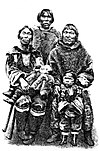Portal:Hamburg/Selected article/Week 39, 2009: Difference between revisions
Appearance
Content deleted Content added
m Delink dates (WP:MOSUNLINKDATES) |
No edit summary |
||
| Line 1: | Line 1: | ||
<div style="float:left;margin-right:0.9em"> |
<div style="float:left;margin-right:0.9em"> |
||
[[Image:Abraham Ulrikab.jpg| |
[[Image:Abraham Ulrikab.jpg|100px|alt=The Ulrikab family: Ulrike, Tobias, Abraham, Maria (on Ulrike's lap) and Sara (standing).]] |
||
</div> |
</div> |
||
Latest revision as of 04:44, 29 March 2014
Abraham Ulrikab (c. 1845 - January 13, 1881) was an Inuk from Hebron, Labrador, in the present day province of Newfoundland and Labrador, Canada, who — along with his family — was to become a zoo exhibit in Europe in 1880 as an attraction at the Hamburg, Germany public zoo.
Ulrikab, along with his wife and two daughters and four other Inuit, had agreed to become the newest attractions in the Hamburg Zoo. On August 26, 1880, all eight Inuit from Labrador boarded the schooner Eisbär (which means "polar bear" in German) to take part in a bizarre display of the native way of the Inuit in northern communities. As instructed by zoo keepers, they simply had to walk, talk, wear their fur parkas and throw the odd harpoon to earn their keep.

